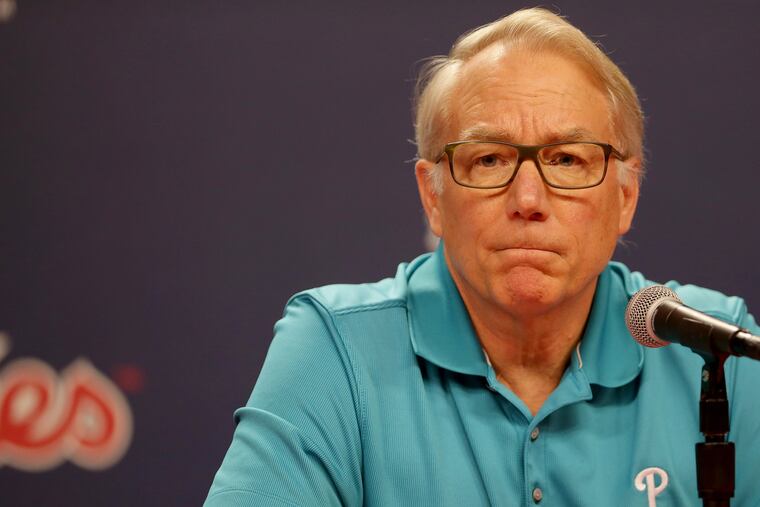Phillies president Andy MacPhail vexed by team’s inconsistency heading into ‘dicey’ offseason
In his annual end-of-season press conference, the Phillies president said he expects the team to get closer to its pre-rebuild payroll levels but also cautioned against being too aggressive in free agency.

Confused by what you saw from the Phillies over these past six months?
So is Andy MacPhail.
The Phillies president showed up Tuesday for his annual end-of-the-season news conference carrying a legal pad filled with notes and numbers. It wasn't all WAR and FIP and the rest of the analytics alphabet soup, either. Instead, there was Zach Eflin's ERA in June (1.76) compared to September ("over 6.00," MacPhail noted). And there was Vince Velasquez's ERA from July ("under 1.00," he noted) juxtaposed with September (10.70). And don't get MacPhail started on Odubel Herrera's cliff dive after mid-June or the monthly fluctuation of Maikel Franco's batting average.
"We were the most inconsistent team I have ever been associated with," MacPhail said.
Amen and hallelujah. It was as simple and candid an evaluation as any Phillies official has offered thus far.
But what can be done about it?
"That's what's going to make the winter a little dicey," MacPhail said, "because if you're going to be making trades, you're going to trade away somebody that has shown they can do it for a finite period of time. Maybe not long enough. But it can backfire on you, too."
Welcome to the Phillies' endlessly compelling offseason, where anything short of trading Aaron Nola and Rhys Hoskins could happen. And who knows, maybe some of it actually will.
MacPhail said the Phillies will come closer to restoring the payroll to their pre-rebuild levels, which was among the top-five in baseball, after opening this season in the bottom half. He described managing partner John Middleton as being "a little crabby to be around lately" after the team's September collapse. And he highlighted the need to improve defensively, generate more consistent offense and add pitching depth.
In the next breath, though, MacPhail discussed the dangers of being too active in the free-agent market. He noted that the Phillies spent $169 million on free agents last offseason — the second-highest outlay of any team — and got only the fourth-most production from Jake Arrieta, Carlos Santana, Tommy Hunter and Pat Neshek based on Wins Above Replacement.
And at a time when officials from rival teams generally believe the Phillies will go all-in for marquee stars Bryce Harper or Manny Machado, MacPhail claimed the team is paying just as close attention to next year's free-agent class, which could include Nolan Arenado, Paul Goldschmidt and J.D. Martinez.
"I guess if you were to invest all you had on one star-type player, then that would be sort of an acknowledgment that you think you may be one player away," MacPhail said. "There's always going to be that push for, 'Sign this guy, sign that guy.' Is that really going to solve the problems that I articulated earlier — the defense, playing within our division better, being more consistent, striking out less?"
Now, that might merely be an attempt to lower the expectations that the Phillies will succeed in luring either Harper or Machado. Or maybe it's posturing to keep the megastars' price tags from rising any higher.
Regardless, MacPhail seems truly vexed by the Phillies' free fall from 38 consecutive days in first place to out of the playoff picture entirely. And he doesn't view the roster through rose-colored glasses, which was evident even before he advised manager Gabe Kapler to temper his unceasing positivity or risk losing credibility with fans.
General manager Matt Klentak said last week that he expects to make "significant changes," all of which MacPhail seems to believe are necessary. MacPhail even might have made a Freudian slip with regard to Franco, a candidate to be traded this winter. In noting that Franco hit .330 in July and .240 in August, MacPhail said, "The other team, maybe they'll find the key."
"Most offseasons, you're looking at, we didn't get production from this position, so we've got to go and improve this position," MacPhail said. "The difficult part that our baseball operations department faces this year is that our [players'] performances, they are sustaining it for a month or so but then it goes away. Their performances are so up and down, but they all demonstrate for a while that they can produce at this level. That's what's going to make this offseason an interesting one.
"I think we're going to have to make some hard evaluations as to, really, are we the first 117 games or are we the last 45? The truth is, we're probably somewhere in between. We don't know exactly which side."
And it's precisely why it feels as though the Phillies are in such a precarious position.